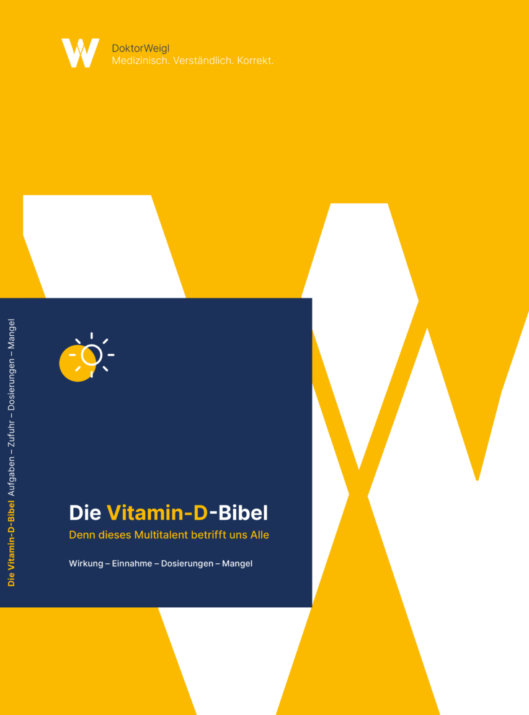
An dieser Stelle finden Sie sämtliche Quellen, die wir für „DoktorWeigls Vitamin-D-Bibel für Sie ausgewertet haben. Den Ratgeber können Sie hier in unserem Shop erwerben.
- Cédric Annweiler et al. (2022): High-Dose Versus Standard-Dose Vitamin D Supplementation in Older Adults ith COVID-19 (COVIT-TRIAL): A Multicenter, Open-Label, Randomized Controlled Superiority Trial, in: PLoS Medicine 19/5.
- Alamin Alkundi et al. (2022): Vitamin D Intoxication and Severe Hypercalcaemia Complicating Nutritional Supplements Misuse, in: BMJ Case Reports.
- Alexander Kunst (2021): Welche Arten von Nahrungsergänzungsmitteln haben Sie in den letzten 12 Monaten eingenommen?, in: statista.com.
- Aya Bassatne et al. (2021): The Link Between COVID-19 and Vitamin D (VIVID): A Systematic Review and Meta-Analysis, in: Metabolism.
- Daniel D. Bikle (2021): Vitamin D: Production, Metabolism and Mechanisms of Action, in: endotext.org.
- Bundesamt für Strahlenschutz (Hg.) (2018): Die verschiedenen Hauttypen, in: bfs.de.
- Bundesinstitut für Risikobewertung (Hg.) (2020): Höchstmengenvorschläge für Vitamin D in Lebensmitteln inklusive Nahrungsergänzungsmitteln, in: bfr.bund.de.
- Bundesinstitut für Risikobewertung (Hg.) (2020): Vitamin D: Einnahme hochdosierter Nahrungsergänzungsmittel unnötig, in: bfr.bund.de.
- Margherita T. Cantorna et al. (2019): Vitamin A and Vitamin D Regulate the Microbial Complexity, Barrier Function and the Mucosal Immune Responses to Insure Intestinal Homeostasis, in: Critical Reviews in Biochemistry and Molecular Biology 54/2, S. 184–192.
- Danilo C. Finamor et al. (2013): A Pilot Study Assessing the Effect of Prolonged Administration of High Daily Doses of Vitamin D on the Clinical Course of Vitiligo and Psoriasis, in: Dermatoendocrinology 5/1, S. 222–234.
- Deutsche Gesellschaft für Ernährung e. V. (Hg.) (2013): Ausgewählte Fragen und Antworten zu Calcium, in: dge.de.
- Deutsche Gesellschaft für Ernährung e. V. (Hg.) (2020): Ausgewählte Fragen und Antworten zu Vitamin A, in: dge.de.
- Deutsche Gesellschaft für Ernährung e. V. (Hg.) (2022): Ausgewählte Fragen und Antworten zu Magnesium, in: dge.de.
- Deutsche Gesellschaft für Gastroenterologie, Verdauungs- und Stoffwechselkrankheiten (Hg.) (2021): Aktualisierte S3-Leitlinie „Diagnostik und Therapie des Morbus Crohn“, in: awmf.org.
- Deutsche Gesellschaft für Neurologie (Hg.) (2021): Diagnose und Therapie der Multiplen Sklerose, Neuromyelitis-Optica-Spektrum-Erkrankungen und MOG-IgK-assoziierten Erkrankungen, in: dgn.org.
- Deutsches Diabetes-Zentrum (Hg.) (2022): Prädiabetes gefährlicher als angenommen, in: ddz.de.
- Deutschsprachige Wissenschaftlich Osteologische Gesellschaften e. V. (Hg.) (2017): Prophylaxe, Diagnostik und Therapie der OSTEOPOROSE bei postmenopausalen Frauen und bei Männern, in: awmf.org.
- Diana Moll (2021): Einnahme von Vitamin D braucht eine eindeutige Indikation, in: deutsche-apotheke-zeitung.de.
- Dieter Steinhilber (2020): Vitamin D – Kritische Betrachtung, in: pharmazeutische-zeitung.de.
- Dirk Lemke et al. (2021): Vitamin D Resistance as a Possible Cause of Autoimmune Diseases: A Hypothesis Confirmed by a Therapeutic High-Dose Vitamin D Protocol, in: Frontiers in Immunology 12.
- Erica W. Mandell (2021): Vitamin D Deficiency in Development: How Much Is Enough, and How Much Is Too Much?, in: American Journal of Respiratory Cell and Molecular Biology 65/5, S. 466f.
- Ernährungskommission der Deutschen Gesellschaft für Kinder und Jugendmedizin & Deutsche Gesellschaft für Kinderendokrinologie und Diabetologie (2018): Vitamin-D-Supplementierung jenseits des zweiten Lebensjahres, in: Monatsschrift Kinderheilkunde 166, S. 814–822.
- Europäische Behörde für Lebensmittelsicherheit (Hg.) (2012): Scientific Opinion on the Tolerable Upper Intake Level of Vitamin D, in: EFSA Journal 10/7, S. 2813.
- Europäische Behörde für Lebensmittelsicherheit (Hg.) (2016): Dietary Reference Values for Vitamin D, in: EFSA Journal 14/10, S. 4547.
- Ezgi Dogan-Sander et al. (2021): Inflammation and the Association of Vitamin D and Depressive Symptomatology, in: Nutrients 13/6, S. 1972.
- Endocrine Society (Hg.) (2011): Evaluation, Treatment, and Prevention of Vitamin D Deficiency, in: The Journal of Clinical Endocrinology & Metabolism 96/7, S. 1911–1930.
- F. Vellekkatt & V. Menon (2019): Efficacy of Vitamin D Supplementation in Major Depression: A Meta-Analysis of Randomized Controlled Trials, in: Journal of Post-graduate Medicine 65/2, S. 74–80.
- Fahad Alshahrani & Naji Aljohani (2013): Vitamin D: Deficiency, Sufficiency and Toxicity, in: Nutrients 5/9, S. 3605–3616.
- Fenil Gandhi et al. (2021): Impact of Vitamin D Supplementation on Multiple Sclerosis, in: Cureus 13/10.
- Forough Farrokhyar et al. (2015): Prevalence of Vitamin D Inadequacy in Athletes: A Systematic-Review and Meta-Analysis, in: Sports Medicine 45, S. 365–378.
- Maria Helde Frankling et al. (2020): Are Vitamin D3 Tablets and Oil Drops Equally Effective in Raising S-25-Hydroxyvitamin D Concentrations? A Post-Hoc Analysis of an Observational Study on Immunodeficient Patients, in: Nutrients 12/5, S. 1230.
- Food-Monitor (Hg.) (2021): Deutscher Markt für Nahrungsergänzungsmittel erreicht 2020 Umsatz von 1,35 Mrd. €, in: food-monitor.de.
- Friederike Klein (2020): Hoch dosiertes Vitamin D gefährdet nicht nur MS-Patienten, in: medical-tribune.de.
- Andrea Guistina et al. (2020): Consensus Statement from 2nd International Conference on Controversies in Vitamin D, in: Reviews in Endocrine & Metabolic 21/1, S. 89–116.
- gesund.bund.de. (Hg.) (2020): Vitamin-D-Mangel, in: gesund.bund.de.
- Glenn Cardwell et al. (2018): A Review of Mushrooms as a Potential Source of Dietary Vitamin D, in: Nutrients 10/10, S 1498.
- Ruth E. Grossmann & Vin Tangpricha (2010): Evaluation of Vehicle Substances on Vitamin D Bioavailability: A Systematic Review, in: Molecular Nutrition & Food Research 54/8, S. 1055–1061.
- Arash Hossein-Nezhad et al. (2013): Influence of Vitamin D Status and Vitamin D3 Supplementation on Genome Wide Expression of White Blood Cells: A Randomized Double-Blind Clinical Trial, in: PLoS One 8/3.
- Harsha Anuruddhika Dissanayake et al. (2022): Prognostic and Therapeutic Role of Vitamin D in COVID-19: Systematic Review and Meta-Analysis, in: Journal of Clinical Endocrinology and Metabolism 107/5, S. 1484–1502.
- Harvard T. H. Chan School of Public Health (Hg.) (2022): Vitamin D, in: hsph.harvard.edu.
- Banafsheh Hosseini et al. (2022): Effects of Vitamin D Supplementation on COVID-19 Related Outcomes: A Systematic Review and Meta-Analysis, in: Nutrients 14/10.
- Christine Hutterer (2021): Vitamin-D-Substitution im Sport – wann sie sinnvoll ist, in: zeitschrift-sportmedizin.de.
- Health Direct (Hg.) (2022): Sources High in Vitamin D, in: healthdirect.gov.au.
- hil/aerzteblatt.de (2021): Nutzen eines regelmäßigen Vitamin-Screenings bei Älteren nicht belegt, in: aerzteblatt.de.
- hil/aerzteblatt.de. (2018): Studienlange spricht gegen Vitamin-D-Supplementierung von Kindern ab zwei Jahren, in: aerzteblatt.de.
- Indra Ramasamy (2020): Vitamin D Metabolism and Guidelines for Vitamin D Supplementation, in: The Clinical Biochemical Reviews 41/3, S. 103–126.
- IQVIA (2022): Nahrungsergänzungsmittel aus der Apotheke 2021, in: iqvia.com.
- Jane Fletcher et al. (2019): The Role of Vitamin D in Inflammatory Bowel Disease: Mechanism of Management, in: Nutrients 11/5, S. 1019.
- Janina Seiffert (2020): Colecalciferol, in: gelbe-liste.de.
- Jens Heidrich (2016): Vitamin D messen, in: Deutscher Apotheker Zeitung 11, S. 44.
- Jens Heidrich (2016): Vitamin D messen. Wie bestimmt und interpretiert man den Serumspiegel richtig?, in: deutsche-apotheker-zeitung.de.
- Jens Peter Hansen et al. (2019): Vitamin D3 Supplementation and Treatment Outcomes in Patients with Depression (D3-vit-dep), in: BMC Research Notes 12, S. 203.
- JoAnn E. Manson et al. (2019): Vitamin D Supplements and Prevention of Cancer and Cardiovascular Disease, in: The New England Journal of Medicine 380/1, S. 33–44.
- John D. Sluyter et al. (2017): Effect of Monthly, High‐Dose, Long‐Term Vitamin D Supplementation on Central Blood Pressure Parameters: A Randomized Controlled Trial Substudy, in: Journal of the American Heart Association 6/10.
- John M. Mandrola (2022): Entzaubert: Was wirklich hinter dem Vitamin-D-Hype steckt – und wie man die Studien bewerten sollte, in: medscape.com.
- Joost Smolders et al. (2019): An Update on Vitamin D and Disease Activity in Multiple Sclerosis, in: CNS Drugs 33/12, S. 1187–1199.
- Jörg Spitz (2022): Superhormon Vitamin D: So aktivieren Sie Ihren Schutzschild gegen chronische Erkrankungen. München, Gräfe und Unzer Verlag GmbH.
- Julia Feige et al. (2020): Vitamin D Supplementation in Multiple Sclerosis: A Critical Analysis of Potentials and Threats, in: Nutrients 12/3, S. 783.
- Justine Vanhevel et al. (2022): The Role of Vitamin D in Breast Cancer Risk and Progression, in: Endocrine-Related Cancer 29/2.
- Kamal Patel (2022): Can Vitamin D Cure Depression?, in: examine.com.
- Anna Książek et al. (2019): Vitamin D, Skeletal Muscle Function and Athletic Performance in Athletes – A Narrative Review 11/8, S. 1800.
- Karani S. Vimaleswaran et al. (2013): Causal Relationship between Obesity and Vitamin D Status: Bi-Directional Mendelian Randomization Analysis of Multiple Cohorts, in: PLoS Medicine 10/2.
- Karen S. van den Berg et al. (2021): Adverse Health Outcomes in Vitamin D Supplementation Trials for Depression: A Systematic Review, in: Ageing Research Reviews 71.
- Karin Amrein et al. (2020): Vitamin Deficiency 2.0: An Update on the Current Status Worldwide, in: European Journal of Clinical Nutrition 74, S. 1498–1513.
- Clemens Kunz & Armin Zittermann (2015): Vitamin D im Kindes- und Jugendalter in Deutschland. Dringlichkeit und Probleme der Umsetzung von Zufuhrempfehlungen, in: Monatsschrift Kinderheilkunde 163, S. 776–782.
- Kevin D. Cashman et al. (2016): Vitamin D Deficiency in Europe: Pandemic?, in: American Journal of Clinical Nutrition 103/4, S. 1033–1044.
- Kim M. Pfotenhauer & Jay H. Shubrook (2017): Vitamin D Deficiency, Its Role in Health and Disease, and Current Supplementation Recommendations, in: Journal of Osteopathic Medicine 117/5, S. 301–305.
- Kirstin Wolf (2022): Wie viel Vitamin D brauchen Kinder?, in: apotheken-umschau.de.
- Kornelia Galior et al. (2018): Development of Vitamin D Toxicity from Overcorrection of Vitamin D Deficiency: A Review of Case Reports, in: Nutrients 10/8, S. 953.
- Lara Fonseca de Olivereia et al. (2019): Obesity and Overweight Decreases the Effect of Vitamin D Supplementation in Adults: Systematic Review and Meta-Analysis of Randomized Controlled Trials in: Reviews in Endocrine and Metabolic Disorders 21, S. 67–76.
- Lars Alfredsson et al. (2020): Insufficient Sun Exposure Has Become a Real Public Health Problem, in: International Journal of Environmental Research and Public Health 17/14, S. 5014.
- Laura Tripkovic et al. (2012): Comparison of Vitamin D2 and Vitamin D3 Supplementation in Raising Serum 25-Hydroxyvitamin D Status: A Systematic Review and Meta-Analysis, in: American Journal of Clinical Nutrition 95/6, S. 1357–1364.
- Lauren A. Burt et al (2022): Response to High-Dose Vitamin D Supplementation Is Specific to Imaging Modality and Skeletal Site, in: Journal of Bone and Mineral Research Plus 6/5.
- Lauren A. Burt et al. (2019): Effect of High-Dose Vitamin D Supplementation on Volumetric Bone Density and Bone Strength. A Randomized Clinical Trial, in: JAMA 322/8, S. 736–745.
- Lauren A. Burt et al. (2020): Adverse Effects of High-Dose Vitamin D Supplementation on Volumetric Bone Density Are Greater in Females than Males, in: Journal of Bone and Mineral Research 35/12, S. 2404–2414.
- Lauren A. Burt et al. (2020): Reply to Effects of High-Dose Vitamin D Supplementation on Bone Fragility, in: Journal of Bone and Mineral Research 36/3, S. 622.
- Yu Yang et al. (2021): Smoking Behavior and Circulating Vitamin D Levels in Adults: A Meta-Analysis, in: Food Science & Nutrition 9/10, S. 5820–5832.
- Luiza Szarpak et al. (2022): Vitamin D Supplementation to Treat SARS-CoV-2 Positive Patients. Evidence from Meta-Analysis, in: 29/2, S. 188–196.
- Luka Vranić et al. (2019): Vitamin D Deficiency: Consequence or Cause of Obesity?, in: Medicina 55/9, S. 541.
- Mahejabeen Fatima et al. (2022): Therapeutic Role of Vitamin D in Multiple Sclerosis: An Essentially Contested Concept, in: Cureus 14/6.
- Maike Wolters et al. (2021): 25-Hydroxyvitamin D Reference Percentiles and the Role of Their Determinants Among European Children and Adolescents, in: European Journal of Clinical Nutrition 76, S. 564–573.
- Maike Wolters et al. (2022): 25-Hydroxyvitamin D Reference Percentiles and the Role of their Determinants Among European Children and Adolescents, in: European Journal of Clinical Nutrition 76, S. 564–573.
- Alberto Muñoz & William B. Grant (2022): Vitamin D and Cancer: An Historical Overview of the Epidemiology and Mechanisms, in: Nutrients 14/7, S. 1448.
- Anke Katharina Müller (2020): Nahrungsergänzungsmittel bei der Krebstherapie: Sinnvolle Ergänzung oder unterschätzte Gefahr?, in: krebsgesellschaft.de.
- Manon Galoppin et al. (2022): Full Spectrum of Vitamin D Immunomodulation in Multiple Sclerosis: Mechanisms and Therapeutic Implications, in: Brain Communications 4/4.
- Maria Helde Frankling et al. (2021): ‚Palliative-D‘-Vitamin D Supplementation to Palliative Cancer Patients: A Double Blind, Randomized Placebo-Controlled Multicenter Trial, in: Cancers 13/15, S. 3707.
- Martina B. Sintzel et al. (2018): Vitamin D and Multiple Sclerosis: A Comprehensive Review, in: Neurology and Therapy 7/1, S. 59–85.
- Martina Rabenberg & Gert Mensink (2016): Vitamin-D-Status in Deutschland, in: Journal of Health Monitoring 1 / 2.
- Mayo Clinic (Hg.) (2021): Vitamin D, in: mayoclinic.org.
- Meghan Meehan and Sue Penckofer (2014): The Role of Vitamin D in the Aging Adult, in: Journal of Aging and Gerontology 2/2, S. 60–71.
- Jadwiga Malczewska-Lenczowska et al. (2018): The Association between Iron and Vitamin D Status in Female Elite Athletes, in: Nutrients 10/2, S. 167.
- mut/ÄrzteZeitung (2013): Übergewicht führt zu Vitamin-D-Mangel, in: aerztezeitung.de.
- Nanyang Liu et al. (2021): Low Vitamin D Status is Associated with Coronavirus Disease 2019 Outcomes: A Systematic Review and Meta-Analysis, in: International Journal of Infectious Diseases 104, S. 58–64.
- Naoko Tsugawa & Masataka Shiraki (2020): Vitamin K Nutrition and Bone Health, in: Nutrients 12/7, S. 1909.
- National Academy of Medicine (2011): Dietary Reference Intakes for Calcium and Vitamin D. National Academies Press, Washington.
- National Institutes of Health (Hg.) (2022): Fact Sheet for Health Professionals, in: ods.od.nih.gov.
- National Institutes of Health (Hg.) (2022): Vitamin D. Fact Sheet for Health Professionals, in: ods.od.nih.gov.
- Nina Lutz et al. (2020): Nebenwirkung einer nicht evidenzbasierten MS-Therapie, in: Swiss Medical Forum 20/1314, S. 230–233.
- Nipith Charoenngam & Michael F. Holick (2020): Immunologic Effects of Vitamin D on Human Health and Disease, in: 12/7, S. 2097.
- Özlem Nalbantoğlu et al (2021): Investigating the Efficiency of Vitamin D Administration with Buccal Spray in the Treatment of Vitamin D Deficiency in Children and Adolescents, in: Journal of Clinical Research in Pediatric Endocrinology 13/4, S. 426–432.
- Olivia I. Okereke et al. (2020): Effect of Long-Term Vitamin D3 Supplementation vs Placebo on Risk of Depression or Clinically Relevant Depressive Symptoms and on Change in Mood Scores. A Randomized Clinical Trial, in: JAMA 324/5, S. 471–480.
- Omeed Sizar et al. (2022): Vitamin D Deficiency, in: StatPearls Publishing.
- Anastassios G. Pittas & Ethan M. Balk (2020): Untangling the Gordian Knot of Vitamin D Supplementation and Type 2 Diabetes Prevention, in: Diabetes Care 43/7, S. 1375–1377.
- Anastassios G. Pittas et al. (2020): Vitamin D Supplementation for Prevention of Type 2 Diabetes Mellitus: To D or Not to D?, in: The Journal of Clinical Endocrinology and Metabolism, 105/12, S. 3721–3733.
- Pinki Mishra et al. (2022): Vitamin D Deficiency and Comorbidities as Risk Factors of COVID-19 Infection: A Systematic Review and Meta-Analysis, in: Journal of Preventive Medicine & Public Health 55/4, S. 321–333.
- Raphaele Teixeira Moreira et al. (2021): Effect of Vitamin D Supplementation on Depression Treatment, in: Revista da Associação Médica Brasileira 67/8.
- René Rizzoli (2021): Vitamin D Supplementation: Upper Limit for Safety Revisited?, in: Aging Clinical and Experimental Research 33/1, S. 19–24.
- Robert Koch-Institut (Hg.) (2019): Antworten des Robert Koch-Instituts auf häufig gestellte Fragen zu Vitamin D, in: rki.de.
- Robert Koch-Institut (Hg.): Diabetes in Deutschland – Erwachsene, in: diab-surv.rki.de.
- Robert Scragg et al. (2014): Long-Term High-Dose Vitamin D3 Supplementation and Blood Pressure in Healthy Adults, in: Hypertension 64/4, S. 725–730.
- Robert Scragg et al. (2017): Effect of Monthly High-Dose Vitamin D Supplementation on Cardiovascular Disease in the Vitamin D Assessment Study. A Randomized Clinical Trial, in: JAMA Cardiology 2/6, S. 608–616.
- Roger Bouillon et al. (2022): The Health Effects of Vitamin D Supplementation: Evidence from Human Studies, in: Nature Reviews Endocrinology 18/2, S. 96–110.
- Samiksha Wasnik et al. (2020): Vitamin D as a Potential Therapy for Multiple Sclerosis: Where Are We?, in: International Journal of Molecular Sciences 21/9, S. 3102.
- Sang-Min Jeon & Eun-Ae Shin (2018): Exploring Vitamin D Metabolism and Function in cancer, in: Experimental & Molecular Medicine 50/4, S. 1–14.
- Sara De Vincentis et al. (2021): How Much Vitamin D is Too Much? A Case Report and Review of the Literature, in: Endocrine, Metabolic & Immune Disorders Drug Targets 21/9, S. 1653–1659.
- Sara E. Gombash et al. (2022): Vitamin D as a Risk Factor for Multiple Sclerosis: Immunoregulatory or Neuroprotective?, in: Frontiers in Neurology.
- Seshadri Reddy Varikasuvu et al. (2022): COVID-19 and Vitamin D (Co-VIVID Study): A Systematic Review and Meta-Analysis of Randomized Controlled Trials, in: Expert Review of Anti-Infective Therapy Aims & Scope.
- Sharmin Hossain et al. (2019): Vitamin D and Breast Cancer: A Systematic Review and Meta-Analysis of Observational Studies, in: Clinical Nutrition ESPEN 30, S. 170–184.
- Shrey Agarwal et al. (2018): Vitamin D and its Impact on Maternal-Fetal Outcomes in Pregnancy: A Critical Review, in: Critical Reviews in Food Science and Nutrition 58/5, S. 755–769.
- Stella Marie Hombach (2021): Das Sonnenscheinpräparat im Schatten des Geldes, in: medwatch.com.
- Stiftung Warentest (Hg.) (2019): Vitamin-D-Pilze. Halten diese Champignons, was sie versprechen?, in: test.de.
- Stiftung Warentest (Hg.) (2022): Vitamin D – den Vitamin-Spiegel bestimmen, in: test.de.
- Szu-Wen Chang & Hung-Chang Lee (2019): Vitamin D and Health – The Missing Vitamin in Humans, in: Pediatrics and Neonatology 60/3, S. 237–244.
- Alan J. Thompson et al. (2018): Multiple Sclerosis, in: Lancet 391/10130, S. 1622–1636.
- Ana Lázaro Tomé et al. (2021): Efficacy of Vitamin D in the Treatment of Depression: A Systematic Review and Meta-Analysis, in: Actas Espanolas de Psiquiatria 49/1, S. 12–23.
- Terry J. Aspray et al. (2019): Randomized Controlled Trial of Vitamin D Supplementation in Older People to Optimize Bone Health, in: The American Journal of Clinical Nutrition 109/1, S. 207–217.
- Tetsuya Kawahara et al. (2022): Effect of Active Vitamin D Treatment on Development of Type 2 Diabetes: DPVD Randomised Controlled Trial in Japanese Population, in: BMJ 377.
- Thierry Passeron et al. (2019): Sunscreen Photoprotection and Vitamin D Status, in: The British Journal of Dermatology 181/5, S. 916–931.
- Thomas Kron (2022): Erneut unerfreuliche Studiendaten für die Anhänger von Vitamin D zur Primärprävention, in: medscape.com.
- Michael L. Traub et al. (2014): Impact of Vitamin D3 Dietary Supplement Matrix on Clinical Response, in: The Journal of Clinical Endocrinology & Metabolism 99/8, S. 2720–2728.
- Toshihiro Sugiyama (2020): Effects of High-Dose Vitamin D Supplementation on Bone Fragility, in: Journal of Bone and Mineral Research 36/3, S. 621.
- Anne Marie Uwitonze & Mohammed S. Razzaque (2018): Role of Magnesium in Vitamin D Activation and Function, in: Journal of Osteopathic Medicine 118/3, S. 181–189.
- US Preventive Services Task Force (2021): Screening for Vitamin D Deficiency in Adults. US Preventive Services Task Force Recommendation Statement, in: JAMA 325/14, S. 1436–1442.
- Uwe Gröber & Klaus Kisters (2018): Vitamin D: Niemals ohne Vitamin K2?, in: Schweizer Zeitschrift für Ernährungsmedizin 4, S. 24f.
- Vanitha A. Jagannath et al. (2018): Vitamin D for the management of multiple sclerosis, in: Cochrane Database of Systematic Reviews 9/9.
- Verbraucherzentrale (2022): Vitamin D-Produkte – wann sind sie sinnvoll?, in: klartext-nahrungsergaenzung.de.
- Verbraucherzentrale (Hg.) (2021): Kombination Vitamin D und Vitamin K2, in: verbraucherzentrale.de.
- Verbraucherzentrale (Hg.) (2021): Marktcheck: Viele Lebensmittel enthalten Vitamin D – trotz Verbots, in: verbraucherzentrale.de.
- Verbraucherzentrale (Hg.) (2022): Calcium, Vitamin D oder Omega-3-Fettsäuren – Benötigen Kinder Nahrungsergänzungsmittel?, in: verbraucherzentrale.de.
- Verônica Indicatti Fiamenghi & Elza Daniel de Mello (2021): Vitamin D Deficiency in Children and Adolescents with Obesity: A Meta-Analysis, in: Jornal de Pediatria 97/3, S. 273–279.
- William G. Tsiaras & Martin A. Weinstock (2011): Factors Influencing Vitamin D Status, in: Advances in Dermatology and Venerology 91/2, S. 115–124.
- Wissenschaftliche Dienste des Deutschen Bundestages (2022): Zum Zusammenhang zwischen dem Vitamin-D-Spiegel und dem Krankheitsverlauf von COVID-19. Studien und weitere Beiträge, in: bundestag.de.
- Michał Wiciński et al. (2019): Impact of Vitamin D on Physical Efficiency and Exercise Performance – A Review, in: Nutrients 11/11, S. 2826.
- Xinyi Li et al. (2018): The Effect of Vitamin D Supplementation on Glycemic Control in Type 2 Diabetes Patients: A Systematic Review and Meta-Analysis, in: Nutrients 10/3, S. 375.
- Yu Zhang et al. (2019): Association Between Vitamin D Supplementation and Mortality: Systematic Review and Meta-Analysis, in: The BMJ 366.
- Zhangyou Guo et al. (2022): Association Between Vitamin D Supplementation and Cancer Incidence and Mortality: A Trial Sequential Meta-Analysis of Randomized Controlled Trials, in: Critical Reviews in Food Science and Nutrition.
- Zhen Wang et al. (2022): Association of Vitamin D Deficiency with COVID-19 Infection Severity: Systematic Review and Meta-Analysis, in: Clinical Endocrinolo-gy 96/3, S. 281–287.












Was denkst Du?